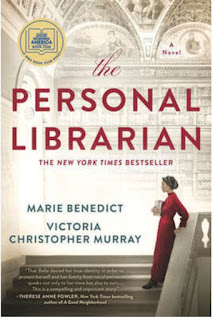Blink Book Review #8: The Personal Librarian by Marie Benedict and Victoria Christopher Murray
The book follows the life of a young woman in the early
1900s who is hired by the mega-wealthy financier JP Morgan to be the personal
librarian for his extensive manuscript and art collection in the Pierpont
Morgan Library in New York City. While this was a perfectly acceptable type of position
for an unmarried young white woman of the time, the intriguing story line of
the book is based around the fact that Belle da Costa Greene is actually Belle
Marion Greener, a Black woman.
The book builds from Belle’s family story that includes her
father, Richard Greener, the first Black Harvard graduate who spent his life as
an activist for equal rights. Belle’s father leaves the family over the fact
that her mother wanted to raise their family as white which was possible
because of the lightness of their complexions. (Although the book never exactly
explains how the family of the first Black Harvard graduate could fly so easily
under the radar, I wrote that off to the times. After all, there was no internet
back then to allow for deep dives into anyone’s past.)
After JP Morgan hires Belle, she carefully crafts her public
persona built around her intelligence, beauty and inner strength. Over the years,
she accumulated great power and wealth – neither of which would be been available
to her had she been seen as Black. Her sometimes over-the-top behavior and flamboyant
dress seemed to draw attention away from questions that might arise about her race.
In an NPR interview, the authors said it was as if she was “almost was hiding
in plain sight.”
This book has all the elements of a great story - influence and power, love and lust, wealth and poverty, family conflicts and human frailties.
But it also raises complex questions about race that our society still struggles
with a century later.
An interesting aside to this historical part of the book,
Belle’s parents lived for a short time in Columbia while her father taught at USC during the university’s
brief period of integration during Reconstruction. There’s a statue in his
memory in front of the Thomas Cooper Library.
The historical notes and author’s notes at the end of the
book shed light on how the authors blended history with fiction. I often skip
over these last pages of a book once I’ve finished reading. In this case, I’m glad
I didn’t as they provide rich insight and context around many of the issues
raised in the book.
# # #
In 2022, I set out to get off the screens and back to books for the summer with a goal of reading a book a week. My accountability was writing short Blink Book Reviews (so short you can read them in a blink). Join my Blink Book Review FB group to follow along for the 2023 summer series. You can email me at reba@themedwaygroup.com.




Comments
Post a Comment
I love hearing from readers. Let me know what you think! Please sign your name if you're not already signed into Blogger so I can see who is posting (otherwise it shows up as anonymous).